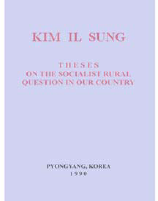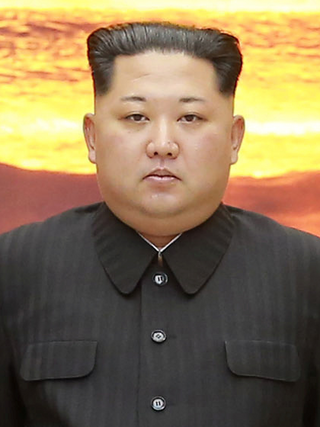
Pyongyang is the capital and largest city of North Korea, where it is sometimes labeled as the "Capital of the Revolution". Pyongyang is located on the Taedong River about 109 km (68 mi) upstream from its mouth on the Yellow Sea. According to the 2008 population census, it has a population of 3,255,288. Pyongyang is a directly administered city with a status equal to that of the North Korean provinces.

Kim Jong Il was a North Korean politician who was the second supreme leader of North Korea. He led North Korea from the death of his father Kim Il Sung in 1994 until his own death in 2011, when he was succeeded by his son, Kim Jong Un. Afterwards, Kim Jong Il was declared Eternal General Secretary of the WPK.

The contemporary culture of North Korea is based on traditional Korean culture, but has developed since the division of Korea in 1945. The Juche ideology conceived by Kim Il Sung (1948–1994) asserts Korea's cultural distinctiveness and creativity, as well as the productive powers of the working masses.

The Pyongyang Metro is the rapid transit system in Pyongyang, the capital and largest city of North Korea. It consists of two lines: the Chollima Line, which runs north from Puhŭng Station on the banks of the Taedong River to Pulgŭnbyŏl Station, and the Hyŏksin Line, which runs from Kwangbok Station in the southwest to Ragwŏn Station in the northeast. The two lines intersect at Chŏnu Station.

Kim Il Sung University, founded on 1 October 1946, is the first university built in North Korea. It is located on a 15-hectare (37-acre) campus in Pyongyang, the nation's capital. Along with the main academic buildings, the campus contains 10 separate offices, 50 laboratories, libraries, museums, a printing press, an R&D center, dormitories and a hospital. There is a large computer lab, but it has limited internet access. The university is named in honour of Kim Il Sung, the founder and first supreme leader of North Korea.

Kim Jong Un is a North Korean politician who has been supreme leader of North Korea since 2011 and the leader of the Workers' Party of Korea (WPK) since 2012. He is the third son of Kim Jong Il, who was North Korea's second supreme leader from 1994 to 2011, and Ko Yong Hui. He is a grandson of Kim Il Sung, who was the founder and first supreme leader of North Korea from its establishment in 1948 until his death in 1994.

The Workers' Party of Korea (WPK) is the sole ruling party of the Democratic People's Republic of Korea, commonly known as North Korea. Founded in 1949 from the merger of the Workers' Party of North Korea and the Workers' Party of South Korea, the WPK is the oldest active party in Korea. It also controls the Korean People's Army, North Korea's armed forces. The WPK is the largest party represented in the Supreme People's Assembly and coexists with two other legal parties making up the Democratic Front for the Reunification of Korea. However, these minor parties are completely subservient to the WPK and must accept the WPK's "leading role" as a condition of their existence. The WPK is banned in the Republic of Korea under the National Security Act and is sanctioned by the United Nations, the European Union, Australia, and the United States.

The Chollima Movement was a state-sponsored Stakhanovite movement in North Korea intended to promote rapid economic development. Launched in 1956 or 1958, the movement emphasized "ideological incentives to work harder" and the personal guidance of Kim Il Sung rather than rational modes of economic management.

Kim Il Sung was a Korean politician and the founder of North Korea, which he ruled from the country's establishment in 1948 until his death in 1994. Afterwards, he was declared its eternal president. His birth name was Kim Song Ju (김성주).
Since the establishment of North Korea, all three of its leaders—Kim Il Sung, Kim Jong Il and Kim Jong Un—have been known to use high-security private trains as their preferred method of domestic and international travel.

The Pyongyang trolleybus system forms part of the public transport network of Pyongyang, the capital city of North Korea, and extends to some of its suburbs.

Kim Il Sung died of a sudden heart attack on the early morning of 8 July 1994 at age 82. North Korea's government did not report the death for more than 34 hours after it occurred. An official mourning period was declared from 8–17 July, during which the national flag was flown at half mast throughout the country, and all forms of amusement and dancing were prohibited.
"On-the-spot guidance" is a term used in the North Korean mass media to describe appearances by the supreme leader of North Korea, often at sites related to the military or to industry, at which the leader gives directives. "On-the-spot" guidance is a key aspect of North Korean propaganda and the North Korean personality cult of the Kim dynasty. Kim Il Sung, Kim Jong Il and Kim Jong Un have all made use of the practice.

The Mansu Hill Grand Monument is a complex of monuments in Pyongyang, North Korea. There are 229 figures in all, commemorating the history of the revolutionary struggle of the Korean people, and especially their leaders. The central part of the monument consists of two 22-meter-tall (72 ft) bronze statues of Kim Il Sung and Kim Jong Il.

The Day of the Sun is an annual public holiday in North Korea on 15 April, the birth anniversary of Kim Il Sung, founder and Eternal President of North Korea. It is the most important national holiday in the country, and is considered to be the North Korean equivalent of Christmas. Kim's birthday, which had been an official holiday since 1968, was renamed Day of the Sun in 1997, three years after his death. The name takes its significance from his name: Il-sung.

Yŏnggwang station is a metro station on the Mangyongdae Line of the Pyongyang Metro.

Kwangbok Station is a station on Hyŏksin Line of the Pyongyang Metro.

Theses on the Socialist Rural Question in Our Country, also known as the Rural Theses or Theses on the Socialist Agrarian Question in Our Country, is a 1964 treatise by Kim Il Sung, the first leader of North Korea. The work lays out the most influential statement on North Korean agricultural policy and its implementation transformed the country's agriculture from a traditional into a modern one. Crop yields were increased, but some environmental problems like deforestation ensued.

Kim Jong Un has been the supreme leader of North Korea since the death of Kim Jong Il, the previous leader and his father.

"Where Are You, Dear General?" is a North Korean song, supposedly written by Kim Jong Il. Since at least 2008, the song plays through speakers of Pyongyang Railway Station in the morning.





















